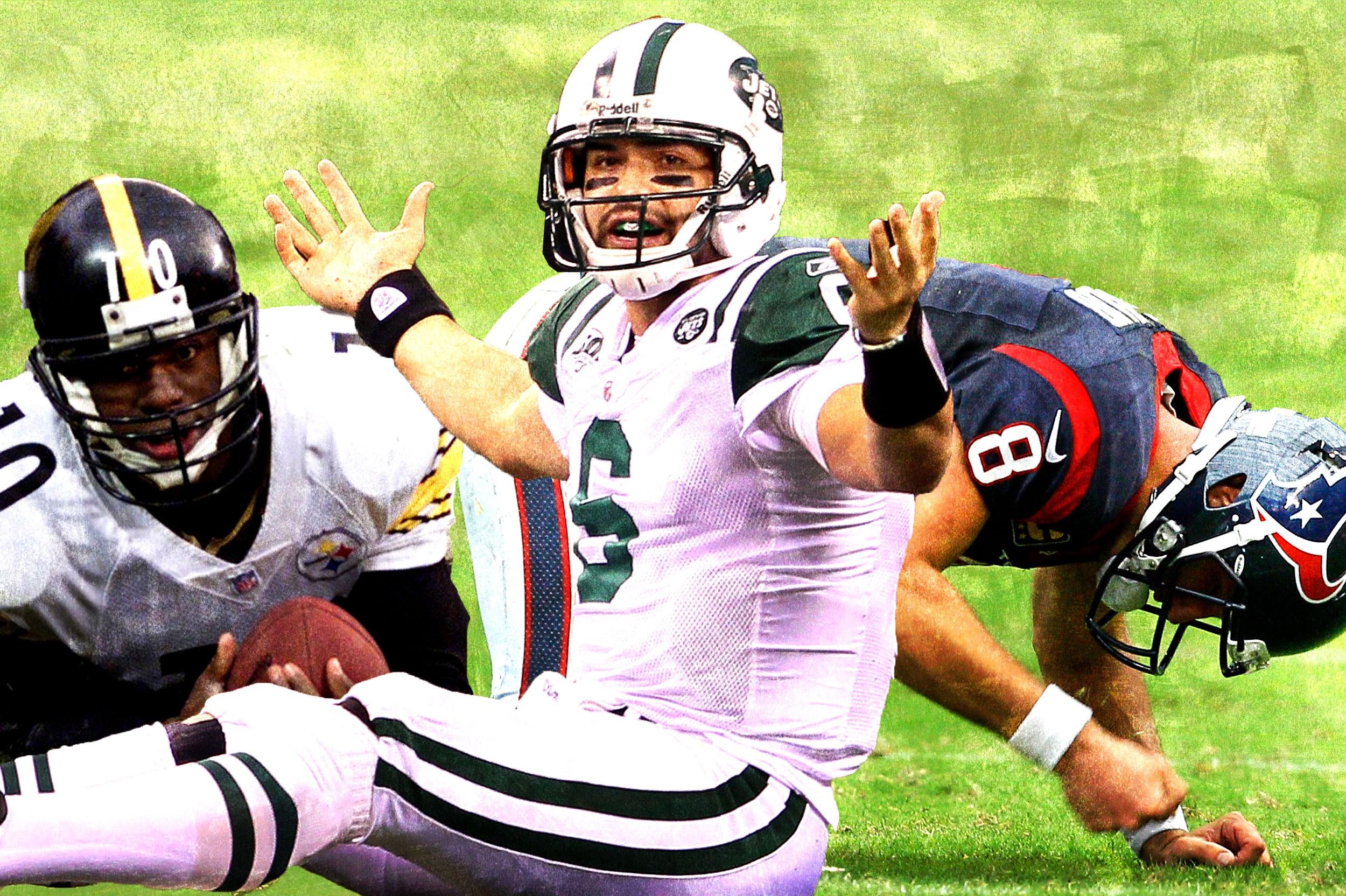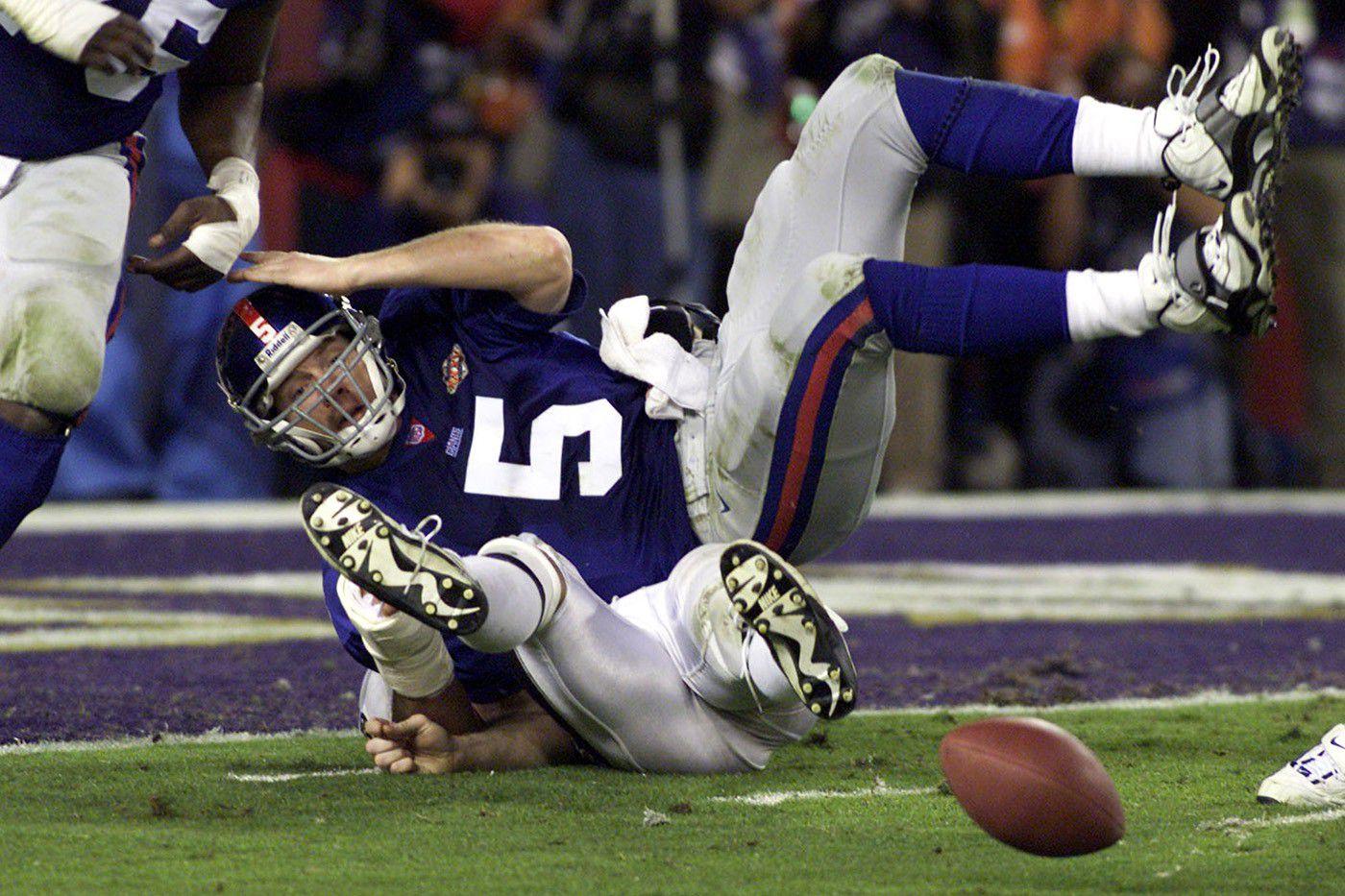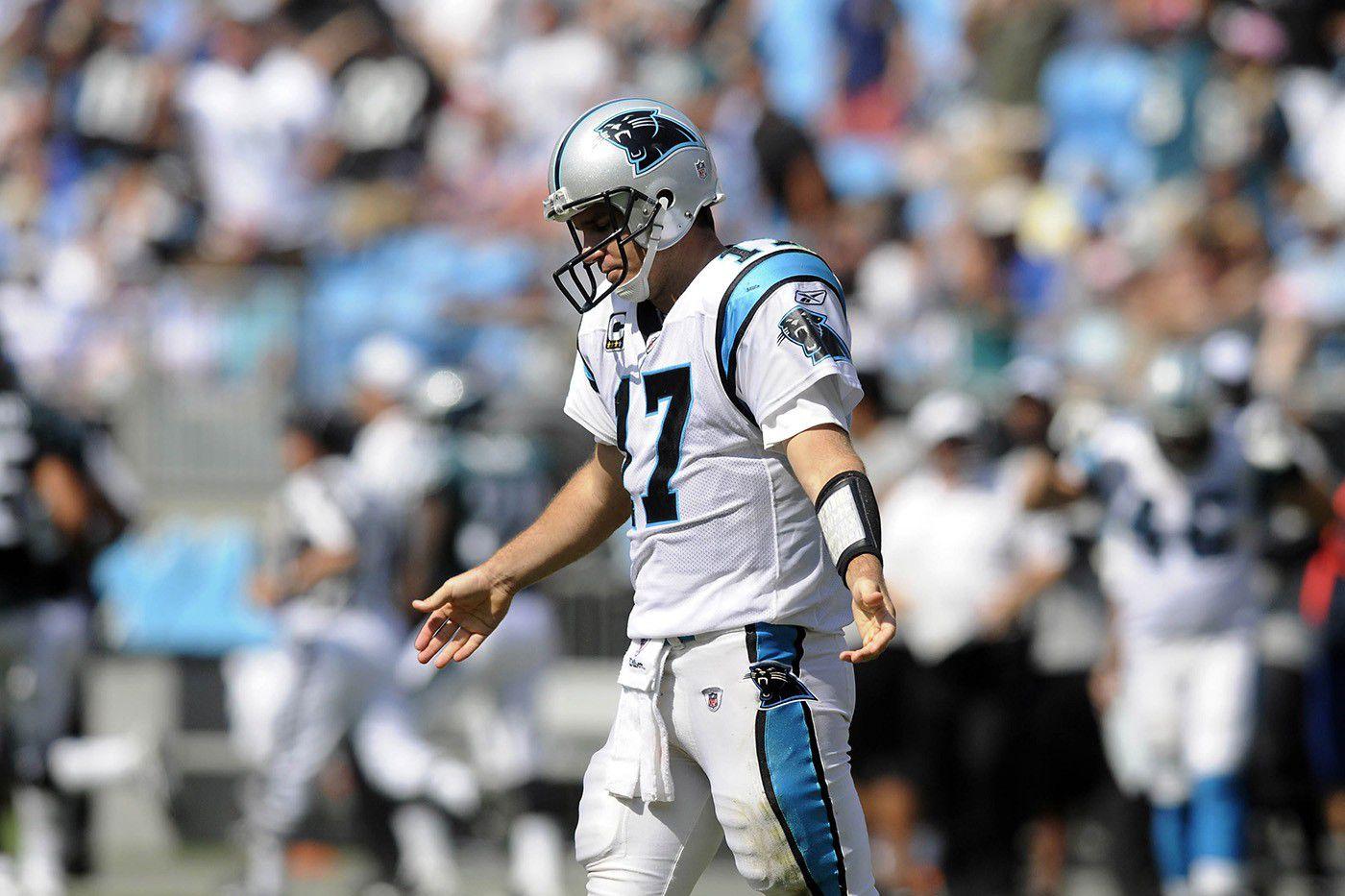
There isn’t much doubt that the Arizona Cardinals will have one of the best defenses in the league in 2016, nor is there any question that they’ll feature one of the most talent-packed offenses. For a well-rounded team coming off a 13–3 season, there’s not much uncertainty heading into this season, except for this: How will Carson Palmer react to his disastrous NFC championship performance? It was one of the worst quarterback meltdowns in NFL history. In the biggest game of his career, the MVP candidate turned it over six times (losing two fumbles and throwing four picks), as the Cardinals were blown out by the Panthers, 49–15.
The 36-year-old passer is at a crossroads: Will the NFC Championship Game signal the beginning of the end for Palmer’s career? Or will it be just one bad game in a sea of great ones?
We’ve seen misadventures on par with Palmer’s game last January, and while some quarterbacks have bounced back to greatness, others have never been the same. What separated those who could weather the storm from those who eventually sank? Let’s go back to see.
Tony Eason, Super Bowl XX
It’s easy to forget that he led the Patriots to three straight road wins and a berth in Super Bowl XX, because Eason holds the dubious distinction of being the only starting quarterback in the league championship’s history to not complete a pass. He took three sacks, lost a fumble, and after starting 0-for-6 against the Bears’ fabled 46 defense and seeing his team fall into a 20–3 hole, he was benched. His replacement, Steve Grogan, didn’t fare much better, and the Patriots went on to lose 46–10.
Eason bounced back from that dismal performance the following year, starting 14 games while leading the Patriots to an AFC East title. However, in New England’s AFC divisional-round matchup against the Broncos, another critical failure compounded his Super Bowl flop. Trailing 20–17 with just under two minutes remaining, New England got the ball back. But a tentative Eason then took a sack in the end zone for a safety, effectively sealing the loss, and his fate as the Patriots starter.
Eason would start just five games over the next two seasons before being put on waivers and picked up by the Jets in 1989. He was out of the league by 1991.
Jim Everett, 1989 NFC Championship
With the Rams down big to San Francisco late in the fourth quarter, a badly rattled Everett — who had thrown three picks in the game — dropped back to pass and then crumpled to the ground without being touched. The play followed him for the rest of his career.
The Rams lost the game, 30–3, and they won just eight games combined over the next two years. Everett looked like the franchise savior when he led the NFL in touchdown passes in both 1988 and 1989, but he was never quite the same after the 49ers debacle. His passing yards and touchdown numbers fluctuated over the next four years. As Everett himself later admitted about the years following the play, “I didn’t always have confidence in myself and the people around me didn’t have confidence in me.”
Ultimately, Everett’s tenure with the Rams ended without another playoff appearance, and in 1994 he was traded to the Saints. But a chance for a fresh start was tarnished before it started when, shortly after the trade, he had a now-infamous on-air altercation with ESPN’s Jim Rome. Everett went on to have a couple solid seasons as the starter for the Saints, but he never regained his pre–Phantom Sack form.
Kerry Collins, Super Bowl XXXV

Baltimore’s dominant defense picked Collins off four times in Super Bowl XXXV, and the veteran completed just 15 of 39 passes in the 34–7 drubbing. Over the next three years, he waffled between competent and bad; his 46 interceptions nearly matched his 52 touchdowns. In 2004, the Giants signed former league MVP Kurt Warner and traded for Eli Manning — two moves that signaled the end of Collins’s tenure in New York. He was released by the Giants and landed in Oakland; after a couple of crappy years there, he signed in Tennessee in 2006, only to promptly lose his job to Vince Young after three games. After an injury to Young in 2008, Collins returned, and though the Titans finished the season at 13–3, he functioned as little more than a game manager, averaging just 167 passing yards per game.
Brett Favre, 2001 NFC Divisional Round
Favre had a game to forget against the Greatest Show on Turf, throwing six interceptions in a 45–17 dismantling. Of course, we’re talking about Brett Favre here — the consummate gunslinger, with the memory of a goldfish. The loss did not affect Favre one bit, as he went on to have five Pro Bowl seasons and start all but three games over the next nine years.
Kordell Stewart, 2002 AFC Championship
Stewart had a career year in 2001. He was elected to the Pro Bowl after passing for 3,109 yards and rushing for another 537 while leading the Steelers to a 13–3 record and the conference’s no. 1 seed. (It didn’t hurt that Pittsburgh also had one of the league’s best defenses.) The Steelers easily dispatched the defending Super Bowl champion Ravens in the divisional round to set up an AFC Championship Game with the Patriots. Pittsburgh was favored by 10 points, but Stewart had a nightmare performance: He lost a fumble in Pittsburgh territory, completed just 24 of 42 attempts, and threw three picks, two of which came in the final three minutes of the fourth quarter of a one-score game. The Pats would go on to win, then defeat the Rams in the Super Bowl.
Just three games into the 2002 season, Stewart was benched in favor of former XFL MVP Tommy Maddox, and after the season ended, Stewart left Pittsburgh to sign with the Bears. He lasted one year with Chicago, where he lost his job to first Chris Chandler and then Rex Grossman. After a few seasons as a backup, he retired in 2006.
Peyton Manning, 2003 AFC Wild-Card Round
The fifth-seeded Colts went into the 2003 wild-card round as six-point underdogs … and then lost to the Jets, 41–0. Manning threw for just 137 yards on 13-of-31 passing and tossed two picks. The loss dropped him to 0–3 in the playoffs and strengthened his reputation as a playoff choker.
Of course, that game didn’t faze Manning, who led the Colts to the playoffs every season until he left Indy. He won the NFL’s MVP award the next two seasons, and then three more times after that. While he struggled against New England in the AFC Championship Game the following season and continued to face scrutiny for his playoff performances throughout his career, his playoff numbers are actually pretty good. In 2006, the Colts beat the Bears 29–17 in Super Bowl XLI, and Manning was named the game’s MVP.
Donovan McNabb, 2004 NFC Championship
With a 14–3 loss to the Panthers, the top-seeded Eagles dropped their third-straight conference title game, thanks to little help from McNabb, who tossed three picks while completing just 10 of 22 passes for 100 yards and a 19.3 quarterback rating before leaving with a rib injury in the fourth quarter.
McNabb bounced back from his dismal performance. The following year, he won NFC Offensive Player of the Year, throwing 31 touchdowns while leading the Eagles to a Super Bowl matchup with the Patriots. McNabb threw for 357 yards, three touchdowns, and three interceptions in the game, but Tom Brady, Deion Branch, and Corey Dillon were too much to handle, as New England prevailed, 24–21. McNabb had another five solid seasons as Philly’s starter before ending with stints in Washington and Minnesota.
Jake Delhomme, 2009 NFC Divisional Round

Delhomme had been a solid if unspectacular signal-caller for the Panthers since 2003. He went to the Pro Bowl in 2005 while leading the Panthers to the NFC Championship Game, he averaged about 20 touchdown passes a year between 2003 and 2008, and he accumulated a 49–30 record as their starter during that stretch. However, that dependability was not on display in the 2009 divisional-round matchup with the Cardinals. Delhomme squandered the Panthers’ home-field advantage by turning the ball over six times (five picks and a fumble), as Carolina lost to Arizona, 33–13. After that career-worst performance, the Panthers … signed the veteran to a five-year, $42.5 million extension that included $20 million in guarantees. It would prove to be a terrible decision.
Delhomme promptly got benched during the first game of the 2009 season after turning the ball over five times. The demotion wasn’t permanent, though, as John Fox stuck with his starter, only to be rewarded with 18 interceptions and just eight touchdown passes. Delhomme then broke his finger and didn’t play after Week 12. He was released the following March, then landed in Cleveland, but played poorly in four starts there. He was a backup in 2011 and out of the league in 2012.
Tim Tebow, 2012 AFC Divisional Round
The euphoria following the Broncos’ thrilling victory over the Steelers in the wild-card round — which saw Tebow pass for a career-high 316 yards and two touchdowns, including the overtime game-winner to Demaryius Thomas — did not last long. Next up were the Patriots, who had a better game plan for stopping Tebow. The southpaw completed just nine out of 26 attempts, took five sacks, and rushed for just 13 yards.
New England won the game 45–10. The Broncos signed Manning in the subsequent offseason. Tebow threw eight passes for the Jets in 2012 and hasn’t played a regular-season game since.
Mark Sanchez, 2012 Week 12
The Butt Fumble is probably the funniest play in NFL history, and certainly one of the most embarrassing. On a broken play against the Patriots on Thanksgiving Day back in 2012, Sanchez inexplicably ran headlong into right guard Brandon Moore’s ass, which ragdolled him to the ground and jarred the ball loose. The Patriots picked it up and returned it for a touchdown. They went on to blow out New York, and Sanchez’s career as a Jet entered into a death spiral.
He was benched in the third quarter of New York’s next game after throwing three picks. He kept his starting job for two more games, but was benched again for poor play. All told, he threw eight interceptions against just one touchdown in his four starts after the Butt Fumble. He then injured his shoulder the following preseason, missed the entire season, and was released in March 2014.
Sanchez started 10 games for the Eagles over the next two years, but produced only tepid results. He will have a shot at resurrecting his career in Denver this first year after Peyton Manning’s retirement.
Matt Schaub, All of 2013
Everything was going so well, too. The Texans signal-caller was coming off a Pro Bowl season during which he’d led Houston to a 12–4 record and signed a four-year, $62 million extension that locked him up as the franchise quarterback for the long term. With Schaub at the helm, and a dominating defense at his back, the sky seemed to be the limit for the Texans.
Two comeback wins to start the 2013 season only added to the hype, but in Week 3, it all started to fall apart.
With Houston leading the Ravens 6–3 in the second quarter, Schaub tried to hit Owen Daniels over the middle and was picked off by Daryl Smith, who returned it for a touchdown. (It was Schaub’s second-straight game with a pick-six.) Baltimore never looked back, going on to win the game 30–9, and Schaub’s nightmare was just beginning.
Late in the next week’s game against Seattle, with the Texans leading 20–13, Schaub tried to hit Daniels again but was intercepted by Richard Sherman, who returned it for a game-tying touchdown. The Seahawks would win in overtime. Unbelievably, it happened again the next week during a 34–3 loss to the 49ers. His four straight games with a pick-six achieved a new NFL record; he threw eight interceptions in that four-game stretch. After injuring his ankle the next week, he never won his starting job back. He was traded to the Raiders the following March.
In 2014, Schaub attempted 10 passes for Oakland, and two of them were intercepted, including his final pass, which was returned for another touchdown. He then had pick-sixes in his only two starts for the Ravens in 2015. In March, he signed a contract with the Falcons to back up Matt Ryan.

They say that a quarterback’s best trait is a short memory. For the quarterbacks who managed to come back from these humiliating performances — Favre, Manning, and McNabb — that talent for memory loss was likely a common denominator. They were also more firmly entrenched as their team’s starters, thanks to a history of success and established trust from their organizations and fan bases. On the other hand, for quarterbacks like Eason, Everett, Collins, Stewart, and Sanchez, who just hadn’t established themselves with their franchises in the same way, it proved hard to recover from such terrible games. And for Delhomme and Schaub, even track records of success and proven histories with their teams were not enough to keep them from tumbling.
With 70 touchdowns and 36 interceptions in his three years in Arizona, along with nine years of mostly solid production before then, Palmer seems to fit into the same category as Manning, Favre, and McNabb. Were Palmer to never recover from last year’s NFC Championship Game, he’d certainly be an outlier, but then again, so were Delhomme and Schaub.

